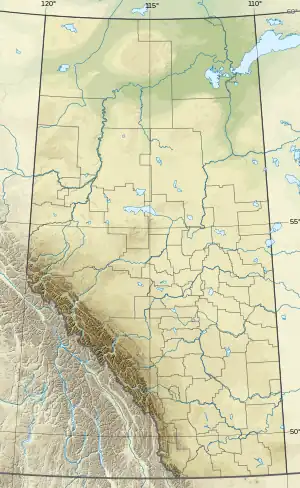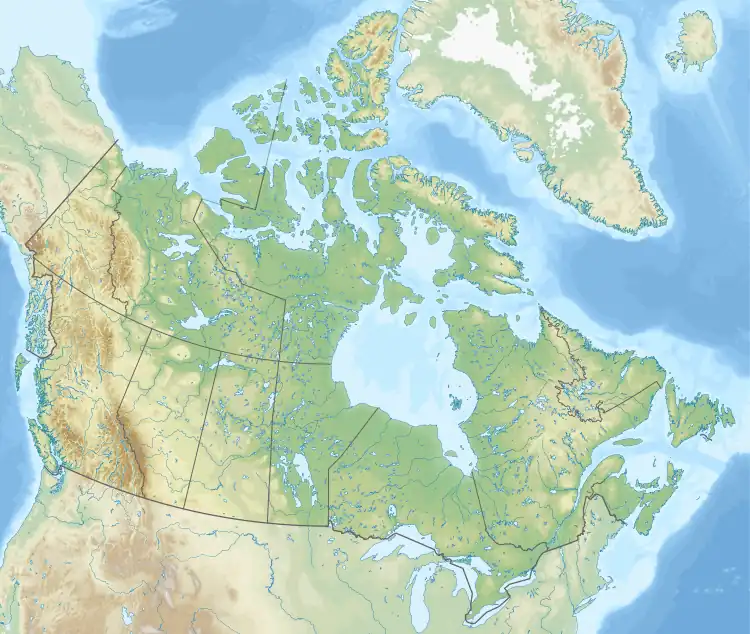| Amber Mountain | |
|---|---|
 Amber Mountain Location of Amber Mountain in Alberta  Amber Mountain Amber Mountain (Canada) | |
| Highest point | |
| Elevation | 2,565 m (8,415 ft)[1][2] |
| Prominence | 145 m (476 ft)[1] |
| Parent peak | The Watchtower (2971 m)[1] |
| Listing | Mountains of Alberta |
| Coordinates | 52°48′42″N 117°54′19″W / 52.81167°N 117.90528°W[3] |
| Geography | |
| Country | Canada |
| Province | Alberta |
| Protected area | Jasper National Park |
| Parent range | Maligne Range Canadian Rockies |
| Topo map | NTS 83C13 Medicine Lake[3] |
| Geology | |
| Age of rock | Cambrian |
| Type of rock | Shale |
| Climbing | |
| Easiest route | Hike |
Amber Mountain is a 2,565-metre (8,415-foot) mountain summit located in the Maligne Range of Jasper National Park, in the Canadian Rockies of Alberta, Canada. Amber Mountain was so named on account of amber-hued shale outcroppings.[4] The mountain was named in 1916 by Morrison P. Bridgland (1878-1948), a Dominion Land Surveyor who named many peaks in Jasper Park and the Canadian Rockies.[1] [5] The mountain's name was officially adopted in 1947 when approved by the Geographical Names Board of Canada.[3] Its nearest higher peak is The Watchtower, 5.0 km (3.1 mi) to the east.[1] Amber Mountain is composed of sedimentary rock laid down during the Cambrian period and pushed east and over the top of younger rock during the Laramide orogeny.[6]
Climate
Based on the Köppen climate classification, Amber Mountain is located in a subarctic climate with long, cold, snowy winters, and mild summers.[7] Temperatures can drop below -20 °C with wind chill factors below -30 °C. Precipitation runoff from Amber Mountain drains into tributaries of the Athabasca River.
See also
References
- 1 2 3 4 5 "Amber Mountain". Bivouac.com. Retrieved 2019-04-03.
- ↑ "Topographic map of Amber Mountain". opentopomap.org. Retrieved 2023-08-13.
- 1 2 3 "Amber Mountain". Geographical Names Data Base. Natural Resources Canada. Retrieved 2019-04-03.
- ↑ Place-names of Alberta. Ottawa: Geographic Board of Canada. 1928. p. 11.
- ↑ MacLaren, I.S. (2005). Mapper of Mountains M.P. Bridgland in the Canadian Rockies 1902-1930. With Eric Higgs, Gabrielle Zezulka-Mailloux. Edmonton, AB: The University of Alberta Press. ISBN 0-88864-456-6.
- ↑ Gadd, Ben (2008), Geology of the Rocky Mountains and Columbias
- ↑ Peel, M. C.; Finlayson, B. L. & McMahon, T. A. (2007). "Updated world map of the Köppen−Geiger climate classification". Hydrol. Earth Syst. Sci. 11: 1633–1644. ISSN 1027-5606.
External links
- Parks Canada web site: Jasper National Park
Gallery
 View from Amber Mountain looking northeast toward Centre Mountain, The Watchtower, and South Amber Mountain
View from Amber Mountain looking northeast toward Centre Mountain, The Watchtower, and South Amber Mountain